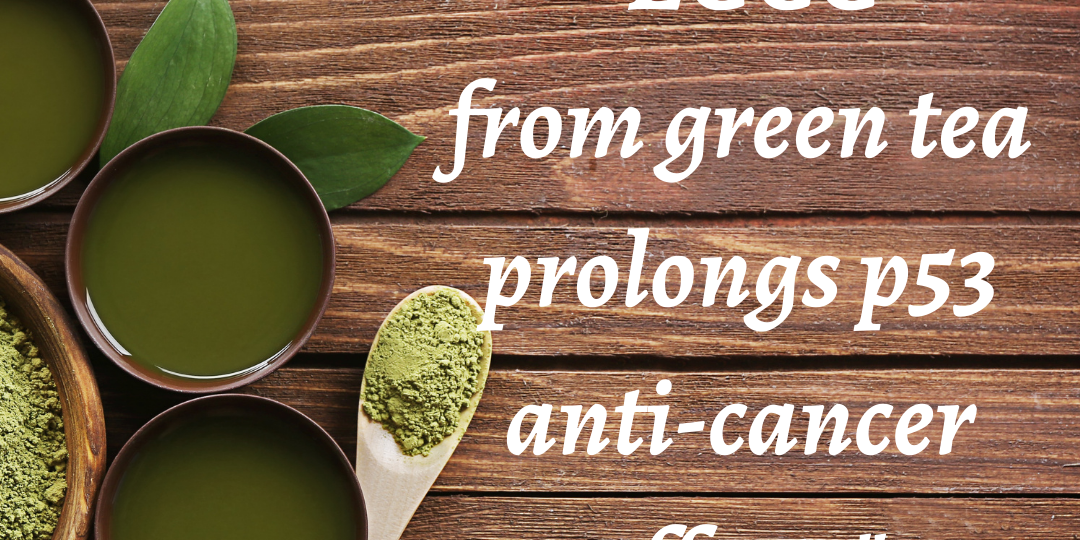Cancer stands out as such a nasty enemy, but a natural substance in green tea appears to strengthen our internal cancer prevention system. While cancer rates continue to rise, efforts to both treat and to prevent have increased including looking to natural compounds. Building on prior awareness of the critical role of a protein called p53 in preventing cancer, researchers found that EGCG from green tea prolongs the lifetime of this p53 protein and may thus decrease cancer risk.
The protein known as p53 comes up as a mutation in about 50% of current cancer cases. This protein, p53, lowers cancer risk through multiple mechanisms (halting cell growth, activating DNA repair, and triggering cell death for cells with damaged DNA). When a mutation disables these functions, cancer can proceed with less to stop it.
EGCG, found in your average green tea and many supplements, binds to this p53 protein and prevents its breakdown. With EGCG binding, p53 can bind to another body protein called MDM2. This binding to MDM2 causes p53 to degrade. When EGCG blocks MDM2 binding, it allows the p53 to continue functioning as a cancer preventer for longer.
Further research must confirm the mechanisms behind this interaction and look at whether or not this prolongation of p53 life leads to actual lower cancer rates. Oops, what do you know? References at the end of this article include other research supporting the beneficial effects of green tea in cancer prevention. It seems that functional MD’s like myself who are already recommending EGCG to our patients can continue to do so with confidence and maybe conventional medicine will eventually follow suit.
Just another day and another drink in the work of helping patients live healthier more abundant lives.
Original Article:
Jing Zhao, Alan Blayney, Xiaorong Liu, Lauren Gandy, Weihua Jin, Lufeng Yan, Jeung-Hoi Ha, Ashley J. Canning, Michael Connelly, Chao Yang, Xinyue Liu, Yuanyuan Xiao, Michael S. Cosgrove, Sozanne R. Solmaz, Yingkai Zhang, David Ban, Jianhan Chen, Stewart N. Loh, Chunyu Wang. EGCG binds intrinsically disordered N-terminal domain of p53 and disrupts p53-MDM2 interaction. Nature Communications, 2021; 12 (1) DOI: 10.1038/s41467-021-21258-5
Thanks to Science Daily:
Rensselaer Polytechnic Institute. “Green tea compound aids p53, ‘guardian of the genome’ and tumor suppressor: Research offers new lead for cancer drug discovery.” ScienceDaily. ScienceDaily, 12 February 2021. <www.sciencedaily.com/releases/2021/02/210212094113.htm>.
Further references for green tea and cancer risk:
Du, G. J. et al. Epigallocatechin gallate (EGCG) is the most effective cancer chemopreventive polyphenol in green tea. Nutrients 4, 1679–1691 (2012).
Khan, N., Afaq, F., Saleem, M., Ahmad, N. & Mukhtar, H. Targeting multiple signaling pathways by green tea polyphenol (-)-epigallocatechin-3-gallate. Cancer Res. 66, 2500–2505 (2006).
Lambert, J. D. & Yang, C. S. Cancer chemopreventive activity and bioavailability of tea and tea polyphenols. Mutat. Res.—Fundam. Mol. Mech. Mutagen. 523–524, 201–208 (2003).
Gan, R.-Y., Li, H.-B., Sui, Z.-Q. & Corke, H. Absorption, metabolism, anti-cancer effect and molecular targets of epigallocatechin gallate (EGCG): an updated review. Crit. Rev. Food Sci. Nutr. 8398, 1–18 (2016)
Imai, K., Suga, K. & Nakachi, K. Cancer-preventive effects of drinking green tea among a Japanese population. Prev. Med. 26, 769–775 (1997).
Nakachi, K., Matsuyama, S., Miyake, S., Suganuma, M. & Imai, K. Preventive effects of drinking green tea on cancer and cardiovascular disease: epidemiological evidence for multiple targeting prevention. Biofactors 13, 49–54 (2000).
Shin, C. M. et al. Green tea extracts for the prevention of metachronous colorectal polyps among patients who underwent endoscopic removal of colorectal adenomas: a randomized clinical trial. Clin. Nutr. 37, 452–458 (2018).
Gupta, S., Hussain, T. & Mukhtar, H. Molecular pathway for (-)-epigallocatechin-3-gallate-induced cell cycle arrest and apoptosis of human prostate carcinoma cells. Arch. Biochem. Biophys. 410, 177–185 (2003).
And the list goes on and on…… Search more for yourself to see.
Sanctuary Functional Medicine, under the direction of Dr Eric Potter, IFMCP MD, provides functional medicine services to Nashville, Middle Tennessee and beyond. We frequently treat patients from Kentucky, Alabama, Mississippi, Georgia, Ohio, Indiana, and more... offering the hope of healthier more abundant lives to those with chronic illness.







